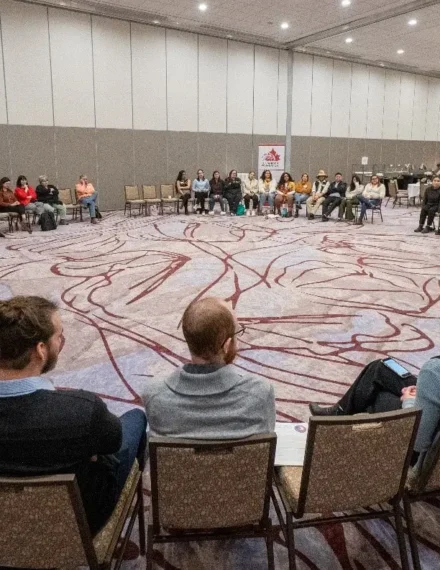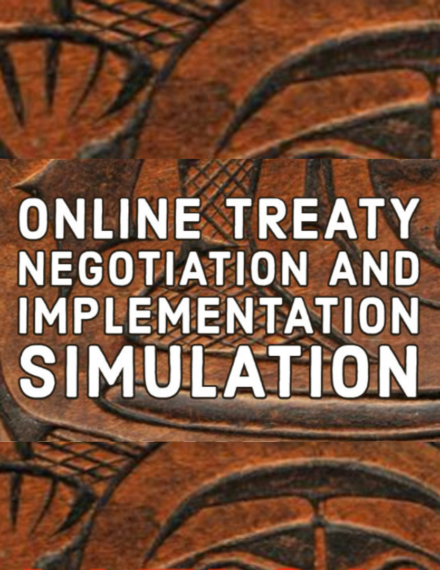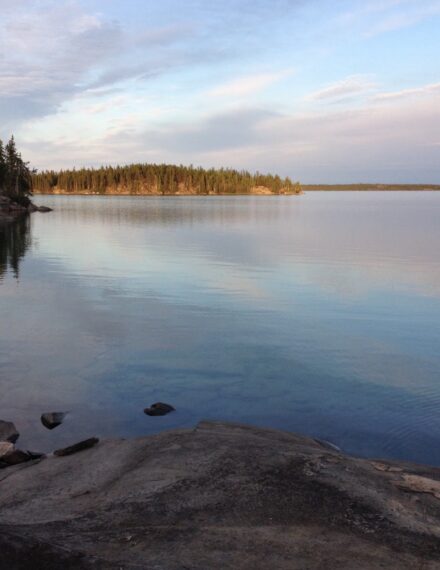
Jocelyn Joe-Strack is a Champagne and Aishihik First Nations scientist. During February 2019, she embarked on a speaking tour of Canadian embassies in Europe to sharing her Indigenous perspective on Climate Change with senior diplomats, academics, youth and the public. She is a 2012 Alumna of the Jane Glassco Northern Fellowship program.
Hola –
My time in Spain was overwhelming, humbling and insightful. I had three presentations with different audiences – each bringing their own, unique perspectives. As I shared my peoples’ stories, songs and aspirations, I could feel their interest and response to my passion.
However, I also felt the audiences’… precipitation. That might seem like an unconventional word choice, but, as a scientist it strikes me as the perfect description to the response in each room.
Precipitation is a chemistry term for when a liquid solution, like salt water, becomes too concentrated and the solid form precipitates out. During my talks, it was as if some members of my audience felt solid as I presented my understandings from a liquid world.
I especially felt this when I presented at the Universidad Carlos III and Universidad Autonoma de Madrid. Many young Spanish are apprehensive to ask questions, especially in English. I was honoured and humbled when many asked questions about my message of hope through reconnection with nature.
How can a young person in the beautiful city of Madrid achieve that? That is a very challenging question and I was not sure what I could offer.
For myself, when I attended university in the south of Canada, I actively sought the forest for my wellbeing. Without nature, I suffered.
Part of what I offered the students was my understanding of what it is to be nurtured and supported by nature. Nature inherently helps one to be present. After five days in the bush, I effortlessly walk with a comfortable calm. The people I spoke with in Spain rarely, if ever, get to experience that state of being. From what I have heard, they very much wish they could.
Being separated from nature makes the climate change challenge that much more complicated. How can humanity return to harmony without knowing what peace is?
I suppose that is in part what I’m here to explore. I am a researcher and as I travel Europe, I am here to define my questions of what matters. For my First Nation’s people, after our trauma, our journey to self-determination, what matters is the wellness of our people. We achieve wellness by reclaiming our language and culture that root us to the land.
I also spent some time considering the history of conflict in many European countries. In Spain, the people are still coming to recognize the lasting impacts of the 1936-1939 Spanish Civil war and Francisco Franco’s resulting authoritarian leadership until his death in 1975. Under the Franco regime there was execution, forced labour, anti-feminism and political oppression. It was a dark time for Spain.
We visited the Museo de Historia de Madrid in an effort to learn more. There were beautiful paintings that began in the 1600s when the city was first designated as the power centre of Spain. This was followed by an era of growth. The word “harmony” was used to depict a time of leisure for the wealthy through the 1700s.
The hardship of the lower class was mentioned, though rarely depicted, throughout the narrative of Madrid. In the 1800s, the French, under Napoleon, came. And it seemed that afterwards, unrest endured. It began with starvation, then ongoing changes in leadership and inner-city struggle. The museum’s account of Madrid ended promptly in the 1930s – just before the Civil War!
Of course, the great history of Madrid and Spain is much more complex than my brief understanding from being in the country for a couple days and visiting a few sites. But in my understanding as a First Nation’s person whose people have also undergone oppression and starvation, I empathize and am searching for understanding in what it has resulted in for the people today.
As a people, First Nations in Canada have put great effort into reconciliation – not just with Canada for residential school and oppressive policies, but also in our relationship with the land.
Through our forced removal, we were unable to fulfill our role as inherent stewards of the land and the Earth that has suffered along with us. We recognize that in order to reclaim the role as caretakers, we must be well ourselves. For us, that is what matters – and again, we know this because we put great effort into healing and reconciliation.
It seems that Spain has not had the same opportunity to reconcile their history of oppression. Franco’s absence from the Museum even spoke that Spain is still in their journey to reconcile their long and recent history.
It really made me appreciate another important lesson that we as Indigenous people are able to offer: the benefit of reconciliation.
My Nation is at the forefront of healing from oppression and we are able to finally wield true self-determination. We have concentrated on our healing in part because our trauma was so recent and abrupt and also because wellness is a part of our culture. For other cultures and societies, while past traumas may have been centuries ago and possibly less sudden, it doesn’t mean that the journey of healing and reconciliation isn’t needed.
Without wellness, societies struggle to realign with what matters. They are unable to truly listen to their youth and put all effort into the future – which today is to safeguard our planet and stop harm towards Earth.
My journey continues in Sweden, Germany and France! Mucho gracias to the lovely, lovely people of Spain. We truly enjoyed our time here with your warm, lively and gracious society.
Jocelyn Joe-Strack is a Champagne and Aishihik First Nations scientist. She is a 2012 Alumna of the Jane Glassco Northern Fellowship program.
During February 2019, she embarked on a speaking tour of Canadian embassies in Europe to share her Indigenous perspective on climate change with senior diplomats, academics, youth and the public. You can follow her travels her, on Twitter @GlasscoFellows or @jocelynjs or by subscribing to The Gordon Foundation newsletter for updates.
Blog 1: An Invitation To Europe
Blog 3: Taking Time To Reflect
Blog 4: Reflections from Picasso
Blog 5: Indigenous reconciliation
Blog 6: Science, Reindeer & Knowledge


